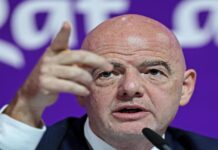It turns out that Stephen Moore has a pretty awful sense of humor. His jokes are lame, tasteless and told with the awkwardness of a guy who really doesn’t get jokes. He’s also prone to say idiotic things about women, race, sports and economics.
This last point should be crucial, since he was up for a seat on the Federal Reserve Board, but because this is Washington, his messy personal life, bad jokes and offensive comments from decades ago did more to kill his nomination than his manifest lack of qualifications or his profound misunderstanding of basic economics.
On Thursday, Moore withdrew his nomination. But this raises the question: How did we ever get this far? Why did conservative insiders think Moore was a serious thinker, or a credible voice on economics? For years, Moore was very much a member in good standing of the conservative supply-side economic establishment. He was a member of the Wall Street Journal editorial board, president of the Club for Growth, and a ubiquitous figure in conservative media, and cable television. More recently, he has been a reliable cheerleader for President Donald Trump, co-authoring an adoring tome titled Trumponomics: Inside the America First Plan to Revive Our Economy.
Along the way, Moore has managed to shift or reverse many of his positions on things like deficits and interest rates to align himself with Trump, but unlike another name floated for the Fed, Herman Cain, Moore still managed to retain a good deal of credibility in conservative circles. This unfortunately speaks volumes about quality control on the right, when a malleable opportunist can become more prominent than a principled economist. Moore figured out that it was less important to be right about economics than it was to say the right things and make the right friends. For a while that looked like it would be enough.
When his name was floated for the Federal Reserve, Georgia Senator David Perdue declared that he was “highly qualified for the position on the Fed,” while Nebraska Senator Ben Sasse gushed that he was “a sunny optimist and a thoughtful economist.”
There were, of course, people, and not just among Democrats, waving warning flags. Conservative economist Greg Mankiw wrote that “Steve is a perfectly amiable guy, but he does not have the intellectual gravitas for this important job … It is time for Senators to do their job. Mr. Moore should not be confirmed.”
Mankiw’s concerns were echoed by the American Enterprise Institute’s Michael Strain, who argued that Moore’s confirmation would undermine public confidence in the Fed’s independence. He noted that Moore “has seemed confused about whether deflation in commodities prices is enough to characterize overall prices as falling. And he has publicly stoked anxiety about ‘hyperinflation’ without solid reason.”
The Hoover Institution’s David Henderson noted that Moore himself had admitted that he “doesn’t have much background in monetary theory or monetary policy.”
Other critics, most notably the Washington Post’s Catherine Rampell, pointed out Moore’s bizarre penchant for taking “wrong, intellectually dishonest and politically malleable economic positions.” These included his lack of understanding of the Volcker rule (he thought it related to commodity prices), his embrace of crackpot theories like returning to the gold standard, and his willingness to flip his positions depending on what policies would give Republicans a partisan advantage. And, Rampell charged, “he lies, and lies, and lies” about his own positions, often doubling down on clear errors of fact.
But these doubts about his qualifications did not seem to dent his support. Just a few weeks ago, 105 economists and conservative activists signed an open letter backing Moore. Even Trump critics seemed willing to go along. Sasse argued that the fact that orthodox economists were criticizing Moore was actually a sign in his favor. “Steve’s nomination has thrown the card-carrying members of the Beltway establishment into a tizzy,” he said, “and that says little about Steve and his belief in American ingenuity, but a lot about central planners’ devotion to groupthink.”

















